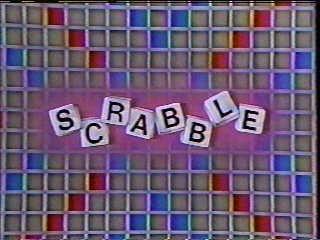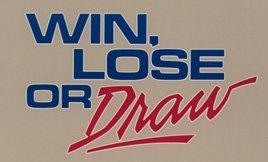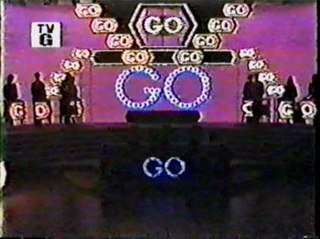
Supermarket Sweep is an American television game show. The format combines an ordinary team-based quiz show with the novel concept of a live, timed race through a supermarket. In the timed race, cameras follow the teams with shopping carts through a large vacated supermarket with several aisles; the value of items thrown into the cart determine the winning team. The original show was broadcast on ABC from December 20, 1965, to July 14, 1967. Later seasons aired on Lifetime from February 5, 1990, to June 16, 1995, and later from April 3, 2000, to May 23, 2003, with reruns airing until March 26, 2004. Another version of the show premiered on October 18, 2020, also on ABC.

Beat the Clock is an American television game show that involves people trying to complete challenges to win prizes while faced with a time limit. The show was a creation of Mark Goodson-Bill Todman Productions.

Scrabble is an American television game show based upon the Scrabble board game. Muriel Green of Exposure Unlimited developed the idea for a television game show based upon the board game concept. During 1983, Green convinced Selchow and Righter, who at that time owned the Scrabble board game, to license Exposure Unlimited to produce the game show. Exposure Unlimited co-produced the show with Reg Grundy Productions, and licensed the show to NBC. Scrabble aired on NBC from July 2, 1984, to March 23, 1990, and again from January 18 to June 11, 1993. Chuck Woolery hosted the program. Jay Stewart was the announcer for the first year. Charlie Tuna replaced him in the summer of 1985 and remained through the original run and the entirety of the 1993 revival.

Win, Lose or Draw is an American television game show that aired from 1987 to 1990 in syndication and on NBC. It was taped at CBS Television City, often in Studios 31, 33, and 43 at various times. It was co-produced by Burt & Bert Productions and Kline & Friends for Disney's Buena Vista Television. It has also had two versions on The Disney Channel: Teen Win, Lose or Draw from 1989 to 1992, and a revived version known as Disney's Win, Lose or Draw which aired in 2014. New York described Win, Lose or Draw as "a knockoff" of the board game Pictionary.
Concentration is an American television game show based on the children's memory game of the same name. It was created by Jack Barry and Dan Enright. The show featured contestants matching prizes represented by spaces on a game board, which would then reveal portions of a rebus puzzle underneath for the contestants to solve.

Chain Reaction is an American television game show created by Bob Stewart, in which players compete to form chains composed of two-word phrases.

The Cross-Wits is an American syndicated game show which premiered on December 15, 1975, and lasted for five seasons until its cancellation on September 12, 1980. The show was hosted by Jack Clark, with Jerri Fiala as hostess. Announcing duties were handled by John Harlan, Jay Stewart, and Jerry Bishop. The show was produced by Ralph Edwards Productions and distributed by Metromedia Producers Corporation.

Go is an American television game show created by Bob Stewart and aired on NBC from October 3, 1983, to January 20, 1984. The show featured two teams, each composed of four contestants and a celebrity. The teams had to construct questions one word at a time to convey a word or phrase to their teammates. The concept of Go was based on "Instant Reaction", an endgame played on two different iterations of another game show created by Bob Stewart, Chain Reaction - in 1980 on NBC and from 2006 to 2007 on GSN.

Body Language is an American game show produced by Mark Goodson Productions. The show aired on CBS from June 4, 1984, until January 3, 1986, and was hosted by Tom Kennedy. Johnny Olson announced until his death in October 1985; Gene Wood and Bob Hilton shared the announcing duties afterward, and had substituted on occasion before that.
Pictionary is an American television game show which aired in syndication during the 1997–1998 season. The game was based on the board game of the same name where contestants guessed words and phrases based on drawings. Alan Thicke hosted the show with Joe Cipriano announcing. The series was a production of Kline and Friends and was distributed by Worldvision Enterprises.

Blackout is an American game show that was broadcast on CBS as part of its daytime schedule from January 4, 1988 until April 1, 1988. The program was created and produced by Jay Wolpert. The game features two contestants, each paired with a celebrity. Contestants attempt to solve word puzzles consisting of a sentence or short paragraph with four blank spaces. Players guess each missing word based on hearing clues recorded by their partner, but with the playback being muted or "blacked out" at certain places by their opponent.

Shopping Spree is a game show that aired on the Family Channel for two seasons from September 30, 1996 to December 26, 1997, with reruns airing until August 14, 1998. Two teams of two unacquainted players went on a shopping spree at six stores, each with four prizes, on a fictional street on stage. The object of the game was to match the desired prizes with visual clues given by the contestant in the quickest amount of time. The show was hosted by Ron Pearson, announced by Burton Richardson and produced by Jay Wolpert Enterprises and MTM Enterprises.
PDQ and Baffle are American television game shows created by Heatter-Quigley Productions. Both shows' objective was for contestant/celebrity teams to guess a given word or phrase in the shortest amount of time with the fewest letters given as possible.

Showoffs is an American television game show which ran on ABC from June 30 to December 26, 1975. Bobby Van was host, with Gene Wood as announcer. The Mark Goodson-Bill Todman production involved two teams competing in a game of charades.

Supermarket Sweep is a British game show that is based on the original American version. Originally hosted by Dale Winton, it ran for exactly 8 years from 6 September 1993 to 6 September 2001 and then revived from 12 February to 31 August 2007 on ITV.
The (£1,000) Pyramid Game is a United Kingdom game show based on the American format of the same name that was originally shown on ITV from 1981 to 1984 then 1989 to 1990 hosted by Steve Jones, then revived by Challenge in 2007 hosted by Donny Osmond.

Three for the Money is an American game show produced by Stefan Hatos-Monty Hall Productions that aired on NBC from September 29 to November 28, 1975. Dick Enberg was the host with Jack Clark announcing. Enberg was also hosting Sports Challenge at the time and had just joined NBC's sports division.
Pyramid is an Australian children's quiz show screening on the Nine Network from 2009-2015 hosted by Shura Taft. It is co-produced by Sony Pictures Television and produced by Sydney-based Ambience Entertainment. It began broadcasting on 1 September 2009 and is filmed in front of a live studio audience. It involves two teams competing in games of "vocal charades". The show is based on the 1979 United States game show The Junior Partner Pyramid, a children's variant of the Sony Pictures Television Pyramid franchise.

Celebrity Name Game is an American syndicated game show which premiered on September 22, 2014. Based on the board game Identity Crisis, the series was developed by Courteney Cox and David Arquette's Coquette Productions, and was originally pitched as a primetime series for CBS with Craig Ferguson as host. The series was later picked up by FremantleMedia and Debmar-Mercury as a syndicated series for 2014 with Ferguson, who left The Late Late Show on December 19, 2014, remaining as host as well as an executive producer. The series marks Coquette's first foray into game shows. The show was subsequently renewed for a second season, which premiered on September 21, 2015.

Celebrity Name Game was an Australian game show based on the American show of the same name and the board game Identity Crisis hosted by Grant Denyer and first premiered on Network 10 on 13 May 2019.














